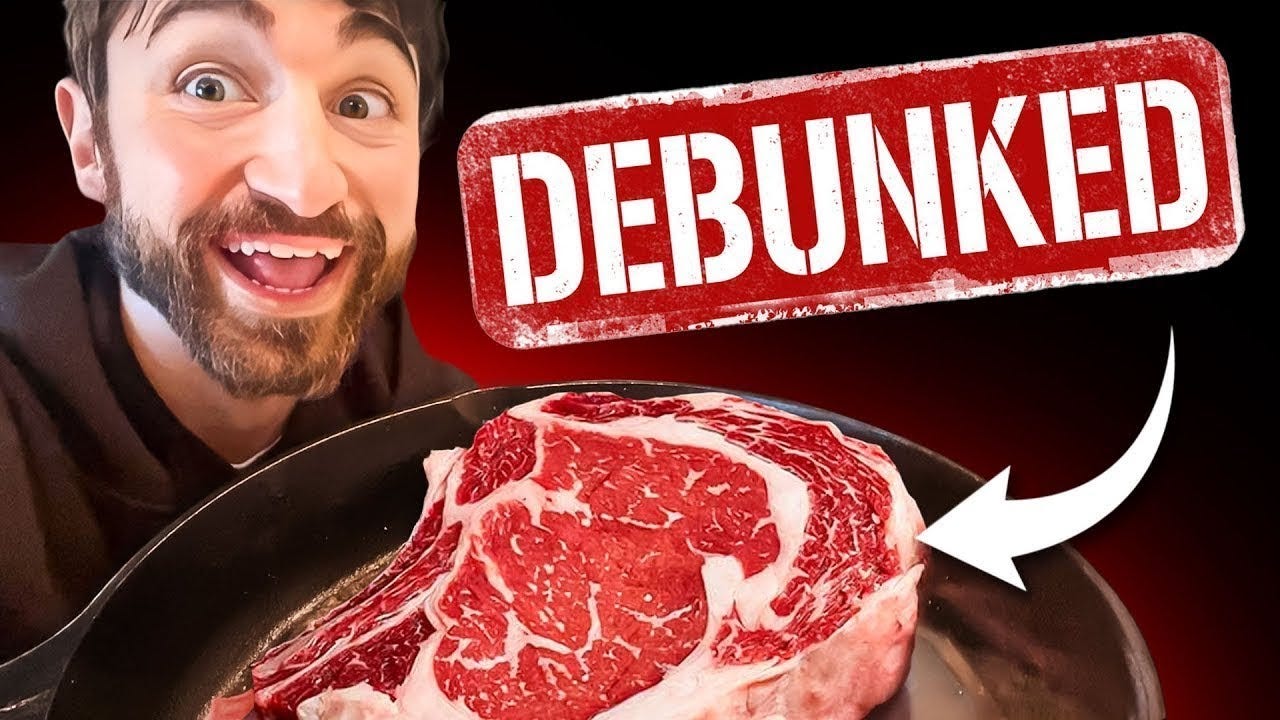Unraveling the Truth: 8 Myths of the Carnivore Diet Exposed by Experts
In a world where dietary trends come and go, the carnivore diet remains a polarizing topic. Advocates swear by its health benefits, while critics raise concerns about its nutritional adequacy and long-term sustainability. As this diet gains traction, it’s essential to sift through the noise and uncover the truth behind common misconceptions. This article delves into eight prevalent myths surrounding the carnivore diet, backed by research from leading experts who aim to clarify misconceptions and provide insights into its implications for health.
Myth 1: The Carnivore Diet Lacks Essential Nutrients
One of the most pervasive myths about the carnivore diet is that it is inherently deficient in essential nutrients. Critics often point out that a diet consisting solely of animal products may lack vitamins and minerals typically found in fruits, vegetables, and grains. However, many proponents argue that animal foods are nutrient-dense. For example:
- Vitamin B12: Found in abundance in meat, this vitamin is crucial for nerve function and the production of DNA and red blood cells.
- Iron: Heme iron from animal sources is more readily absorbed by the body compared to non-heme iron from plant sources.
- Fat-Soluble Vitamins: Vitamins A, D, E, and K are present in high quantities in animal fats.
Experts suggest that individuals on a well-planned carnivore diet can meet their nutritional needs by choosing a variety of animal products, including organ meats, which are particularly rich in vitamins and minerals.
Myth 2: The Carnivore Diet Is Unhealthy and Increases Disease Risk
Another common belief is that the carnivore diet leads to an increased risk of chronic diseases, primarily due to its high saturated fat content. However, recent studies have begun to challenge this notion. Research indicates that saturated fat does not necessarily correlate with heart disease risk for everyone, and many people thrive on high-fat diets.
Dr. Paul Saladino, a prominent advocate for the carnivore diet, emphasizes that the quality of animal products matters. Grass-fed beef, for instance, contains higher omega-3 fatty acids and lower levels of omega-6 fatty acids, which can mitigate inflammation and promote heart health.
Myth 3: The Carnivore Diet Is Just Another Fad
While the carnivore diet may seem like a trendy new approach to eating, its roots can be traced back to ancestral diets. Many indigenous people thrived on diets high in animal products, showcasing the potential for this eating style to support health and longevity. Experts argue that the carnivore diet is not merely a fad but a return to a more natural way of eating.
Myth 4: You Can’t Get Enough Fiber on the Carnivore Diet
Fiber is often touted as a vital component of a healthy diet, primarily for its role in digestive health. Critics of the carnivore diet assert that the absence of plant foods means a lack of fiber, which could lead to constipation or other gastrointestinal issues. However, anecdotal evidence suggests that many individuals on the carnivore diet report regular bowel movements without the need for fiber.
Moreover, some researchers argue that fiber is not as essential as once thought. The body can adapt to different dietary patterns, and in the absence of fiber, it may utilize other means to maintain gut health.
Myth 5: The Carnivore Diet Is Expensive
Many assume that a diet based primarily on animal products is prohibitively expensive. While high-quality meats can be costly, there are budget-friendly options. Ground meats, organ meats, and less popular cuts can provide nutritional benefits without breaking the bank. Additionally, buying in bulk and sourcing from local farms can significantly reduce costs.
Experts point out that investing in a carnivore diet can lead to reduced healthcare costs in the long run, as individuals may experience improved health outcomes.
Myth 6: You Will Miss Out on Variety
One might think that a diet consisting solely of animal products would be monotonous. However, the carnivore diet offers a surprising range of choices. From beef, pork, and chicken to fish and a variety of organ meats, there’s plenty of room for culinary creativity. Experts suggest experimenting with different cooking methods and seasonings to enhance the overall experience.
Moreover, many carnivores enjoy the simplicity of meal preparation, leading to less time spent cooking and planning meals.
Myth 7: The Carnivore Diet Leads to Nutritional Deficiencies
Many fear that eliminating entire food groups will result in nutritional deficiencies. However, supporters of the carnivore diet argue that, when done thoughtfully, it can provide all necessary nutrients. For instance:
- Calcium: Sources like bone marrow and fish with bones (e.g., sardines) can provide adequate calcium.
- Vitamin C: While plant foods are the primary source, some organ meats, such as liver, contain significant amounts.
Experts emphasize the importance of variety within the carnivore framework to ensure comprehensive nutrient intake.
Myth 8: The Carnivore Diet Is Not Sustainable
Finally, critics often claim that the carnivore diet is unsustainable due to its reliance on animal agriculture. While it’s true that livestock farming has environmental impacts, proponents argue that regenerative agriculture practices can mitigate these effects. Additionally, a carnivore diet can be sustainable on a personal level, as many individuals report feeling more energetic and healthier, leading to better long-term health outcomes.
Conclusion
In summary, the carnivore diet is steeped in myths that often overshadow its potential benefits. By unraveling these misconceptions, we can better understand the diet’s implications for health. While it may not be suitable for everyone, many individuals have found success and improved health markers through its adoption. As with any dietary approach, it’s crucial to listen to your body, consult with healthcare professionals, and make informed choices.
As this diet continues to gain popularity, ongoing research and discourse will undoubtedly provide further insights into its efficacy and sustainability, helping individuals make the best choices for their unique health journeys.
See more WebMD Network



